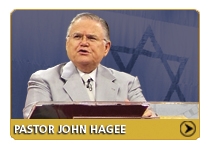 Last week’s decision by nearly 100 conservative Christian activists meeting in Denver to coalesce around presumptive Republican presidential nominee John McCain was a major coup for a candidate whose relationship with the Christian Right has been famously stormy. But the Denver meeting’s organizer, Mathew Staver–founder and chairman of Liberty Counsel and dean of Liberty University School of Law–says the activists’ new unity around McCain should not be taken as evidence of a stepped-up religious outreach effort by the Arizona senator, or as a sign that evangelicals are warming to him personally.
Last week’s decision by nearly 100 conservative Christian activists meeting in Denver to coalesce around presumptive Republican presidential nominee John McCain was a major coup for a candidate whose relationship with the Christian Right has been famously stormy. But the Denver meeting’s organizer, Mathew Staver–founder and chairman of Liberty Counsel and dean of Liberty University School of Law–says the activists’ new unity around McCain should not be taken as evidence of a stepped-up religious outreach effort by the Arizona senator, or as a sign that evangelicals are warming to him personally.
In fact, Staver said in an interview yesterday that much of the Denver meeting was focused on building a long-term strategy for the Christian Right to avoid getting stuck with another figure like McCain–who’s angered the Christian Right with his sponsorship campaign finance reform legislation, by opposing a constitutional amendment to ban gay marriage, and by once calling the movement’s leaders “agents of intolerance”–at the top of the Republican ticket in future election cycles. “If we had gathered around Huckabee, he’d be the nominee right now,” said Staver, an ardent supporter of the former Arkansas governor and ordained Baptist minister during the primaries. “One thing that happened in the primaries is that there was not unity around the core values and people went off in different directions.”
Staver said that the decision of the activists in Denver–mostly evangelicals–to coalesce around McCain was born of a simple political calculus that the Arizona senator would be a preferable alternative to Barack Obama on issues like abortion, gay marriage, and the judicial appointments. “I wouldn’t say the McCain campaign had attempted to contact evangelicals–I wouldn’t say there’s been an affirmative attempt to reach out,” he said. “And the situation with John Hagee and Rod Parsley [two evangelical figures who’d endorsed McCain but who he distanced himself from in May], that didn’t go over well with evangelicals. He threw them under the bus.”
Going forward, Staver said, the activists in Denver felt that supporting McCain was more likely to advance their agenda than staying home on Election Day, supporting Obama, or backing a third-party candidate. “This election is not about McCain, and that’s one thing I tried to emphasize at the meeting,” he said. “This is about how we best pursue our core values and advance Christian principles. When you compare McCain to Obama, there’s no choice… [McCain] might not represent everything you want in a candidate, but Obama would decimate our values.”
Still, Staver said that one of the key concerns among the Christian activists in Denver was that Obama was appealing to young evangelicals, Hispanics, African Americans, and women–constituencies that he said conservative evangelical leaders had neglected. “There’s definitely a concern among evangelicals that [Obama]] might see some come to his side because of his rhetoric of change,” he said.
To help the Christian Right beef up their own outreach to those communities, the Denver meeting included presentations by the Rev. Sam Rodriguez, president of the National Hispanic Christian Leadership Conference (the National Hispanic Association of Evangelicals), and Alex and Bret Harris, the young twin brothers who co-founded Huck’s Army, a national web-based network of Huckabee backers that was a major base of organizational support during the primaries. “If you go on Facebook, all the organizations are liberal, and Obama is advertising there,” Staver said. “Conservative Christians have done a bad job of using it.”
Nonetheless, Staver said that appealing to evangelicals to vote for McCain on practical grounds would be a relatively easy sell. “We need to indicate that what’s at stake in this election are our values,” he said. “If that doesn’t motivate you, I don’t know what will.”
7

